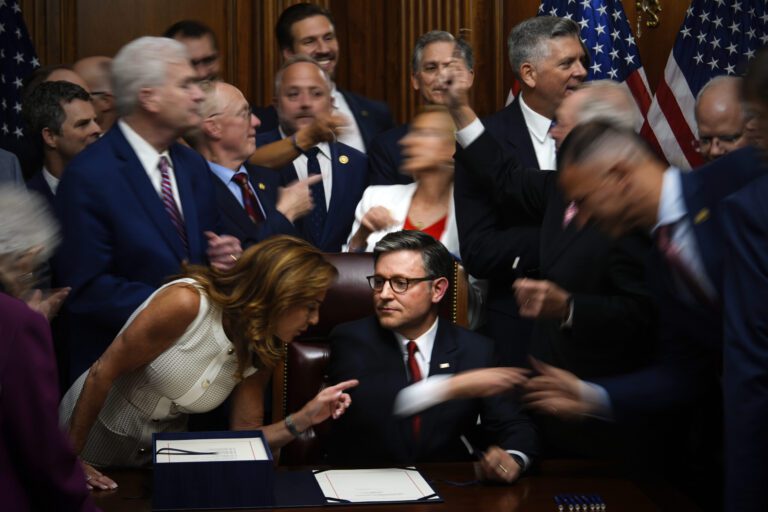GOP and Democrats Gear Up for Imminent Government Funding Showdown
As the deadline for government funding approaches on October 1, both Republicans and Democrats are ramping up their messaging strategies, eager to stave off a potential government shutdown. The stakes are high, and both parties are already positioning themselves to navigate the turbulent waters ahead.
GOP Leadership Targets Democrats
The Republican leadership in both the House and Senate has emerged from a crucial week, attempting to shift blame onto Democrats even before the government runs out of funds.
Funding Proposal Details
The tension escalated when Speaker Mike Johnson unveiled his funding proposal, aiming to extend current spending through mid-November. This proposal includes:
- An extension of existing funding
- $80 million dedicated to increased security measures for lawmakers, Supreme Court justices, and members of the executive branch in response to recent threats, including the assassination of conservative activist Charlie Kirk.
“We’re going to get this government funded,” Johnson asserted in an interview with the New York Sun. “Our appropriators will have more time to do their work.”
Blame Game Begins: #SchumerShutdown
In the Senate, Majority Leader John Thune is already testing out the narrative of a “Schumer Shutdown.” Following conversations with Minority Leader Chuck Schumer, who indicated that Democrats may block the funding bill, Thune stated that the Republicans merely seek additional time for bipartisan appropriations.
“We’re simply asking for a few more weeks to complete bipartisan appropriations work,” Thune expressed during a Senate floor speech, which he later shared on X (formerly Twitter), including the now-popular hashtag #SchumerShutdown.
Senate Voting Requirements
To pass any funding measure, a 60-vote threshold is required in the Senate. This procedural hurdle creates significant leverage for Democrats, who are being urged by progressive voices to push for specific concessions this time around.
Democrats Push Back with Their Proposal
In a strategic move to enhance their counter-narrative, leading Democrats, specifically Congresswoman Rosa DeLauro and Senator Patty Murray, presented their own bill. This proposal includes:
- Funding to keep the government open through the end of October
- Extension of Biden-era subsidies for the Affordable Care Act
- Measures to limit former President Trump’s ability to cut funding unilaterally.
Democratic Strategy Shift Post-March Funding Debacle
This fighting spirit among Democrats is largely fueled by the backlash they experienced during the March funding negotiations when a spending bill authored by Republicans was advanced with support from some Democrats. Many party leaders and voters criticized Schumer for enabling that outcome, thereby pressuring him to adopt a firmer stance in the current negotiations.
As Ezra Klein from the New York Times notes, there is a growing sentiment among liberal commentators calling for Schumer to push for specific concessions regarding healthcare and Trump’s impoundment powers.
Republican Polling Concerns Drive Messaging
Recent polling data has revealed concerning statistics for Republican leaders, showing that a majority of voters—59%— would hold Trump and congressional Republicans responsible for a potential shutdown. In contrast, only 34% indicated they would blame Democrats. This data may incentivize the GOP to double down on their narrative that Democrats are at fault if the government shuts down.
The Political Landscape Ahead
With the Senate returning on September 28 for just two days to deliberate on the funding bill, the political maneuvering is expected to intensify. Both parties are fully aware that these negotiations could shape the political narrative leading into the next election cycle.
In this high-stakes environment, the question remains: Will a bipartisan agreement emerge before the funding deadline, or will the blame game escalate to a government shutdown?
Conclusion
As both parties prepare for this critical juncture in government funding, the implications for voters and lawmakers alike are significant. The outcome of these negotiations will not only influence immediate funding but could very well determine the political landscape for months to come.
For ongoing updates on government funding and negotiations, visit reputable news sources such as NPR and Politico.


